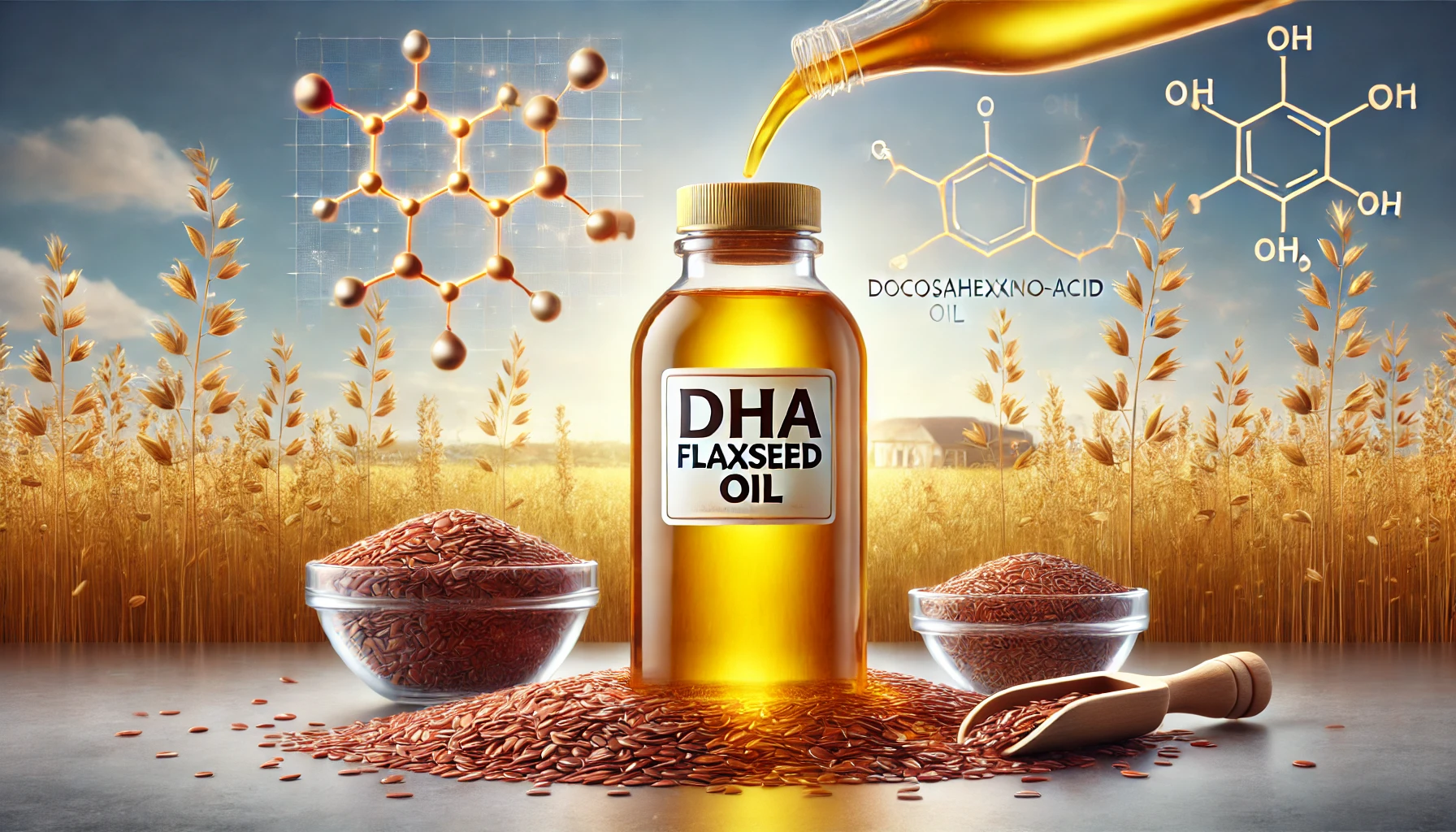Due to its multiple health advantages, the omega-3 fatty acid docosahexaenoic acid (DHA) has received a lot of attention lately. One important plant-based source of DHA among the many available options is flaxseed oil. It has been demonstrated that adding DHA flaxseed oil to dietary supplements improves the quality of sleep. For people looking to improve their sleep quality, this article explores the chemistry, health advantages, recommended dosage, adverse effects, possible drug interactions, and safe usage of DHA flaxseed oil.
You May Also Like:
A Mike Huckabee Sleep Aid vs DELTA BrainLuxury
Relaxium Sleep Reviews vs DELTA BrainLuxury Reviews
Docosahexaenoic acid (DHA) Flaxseed Oil: (DHA) Algae Oil: Benefits, Dosage, Side Effects, Drug Interactions, andAnd Other Important Information is an original (MedNewsPedia) article.
Nature of Docosahexaenoic Acid (DHA)
Flaxseeds, which are tiny, nutrient-dense seeds from the Linum usitatissimum plant, are the source of DHA flaxseed oil. The precursor of DHA is alpha-linoleic acid and it is a precursor to DHA. To maintain its nutritional value, the oil is cold-pressed from these seeds, producing a high-quality, unrefined oil that is packed with lignans, omega-3 fatty acids, and other healthy ingredients.
For people seeking plant-based sources of omega-3 fatty acids, particularly vegetarians, vegans, and those with allergies or intolerances to fish and seafood, DHA flaxseed oil is a beneficial substitute. DHA is essential for supporting brain health, cardiovascular health, and better sleep quality, and can be obtained by including flaxseed oil in the diet or as a supplement.

Health Benefits of DHA
1. Better Sleep: Melatonin, the hormone that controls sleep-wake cycles, is produced in large part thanks to DHA. Increased melatonin production helps to induce and lengthen sleep which then leads to a higher amount of DHA in the brain.
2. Neuroprotection: DHA has a crucial structural role in the membranes of neuronal cell structures, supporting neurogenesis, synaptogenesis, and synaptic plasticity. Moreover, it demonstrates anti-inflammatory and antioxidant qualities that shield the brain from oxidative stress and neuroinflammation, both of which can be factors in sleep problems.
3. Cardiovascular Health: It has been demonstrated that omega-3 fatty acids, especially DHA, promote cardiovascular health by lowering triglyceride levels, reducing inflammation, and avoiding plaque accumulation in the arteries. By lowering the likelihood of sleep-disrupting diseases like sleep apnea and restless leg syndrome, people with improved cardiovascular health can get higher-quality sleep.
4. Control of mood: DHA affects the manufacture and operation of neurotransmitters including serotonin and dopamine, which are essential for controlling mood. Sufficient DHA consumption can improve the quality of sleep by reducing the effects of anxiety and depression.
Chemistry of DHA
Docosahexaenoic acid is an omega-3 family member and a long-chain polyunsaturated fatty acid (PUFA). Its 22-carbon chain has six double bonds in its chemical structure, making it extremely unsaturated. Alpha-linolenic acid (ALA) is an important fatty acid that can be transformed into DHA and eicosapentaenoic acid (EPA) in the body through a sequence of desaturation and elongation events which is abundant in flaxseed oil, which is made from the seeds of the Linum usitatissimum plant. Although ineffective, this conversion pathway permits the body to obtain DHA from a plant-based source.
Physiological Mechanism of Action of DHA
The bioactive substances found in DHA flaxseed oil can affect the brain and body in different physiological mechanisms of action mentioned below:
1. ALA to DHA conversion: ALA from flaxseed oil is ingested and then goes through a series of desaturation and elongation processes to become DHA. Although not very effective, this technique allows the body to get DHA from a plant-based source. Nonetheless, there might be individual differences in ALA to DHA conversion rates.
2. Cell membrane incorporation: As mentioned, DHA is an essential constituent of the phospholipid bilayer that makes up cell membranes, especially in the brain and retina. It is mostly absorbed into membrane phospholipids which help to improve membrane fluidity and enable membrane-bound proteins, such as ion channels, receptors, and enzymes, to function at their very best.
3. Modulation of neurotransmitter systems: DHA affects the production, action, and function of a number of neurotransmitters, including acetylcholine, dopamine, and serotonin. The proper operation of these neurotransmitters is crucial for preserving general brain health. These neurotransmitters are involved in the control of mood, cognition, and sleep.
4. Impact on melatonin synthesis: Increased melatonin synthesis has been linked to higher DHA levels in the brain which can help induce sleep and lengthen sleep.
5. Anti-inflammatory and antioxidant effects: DHA has anti-inflammatory and antioxidant characteristics that help fight oxidative stress and the formation of pro-inflammatory mediators. DHA can safeguard the brain from neurodegenerative processes and advance general brain health, both of which can increase the quality of sleep.
6. Control of gene expression: DHA has the ability to modify the expression of a number of genes involved in conditions including oxidative stress, neurogenesis, and neural plasticity. These regulating effects may help to maintain brain health and function, which may improve the quality of sleep.

Optimal Dosage of DHA
Depending on variables including age, sex, and general health, the ideal DHA flaxseed oil dosage may change. According to general recommendations, adults should consume 250–500 mg of mixed EPA and DHA per day. Since only about 0.5–9% of ALA is converted to DHA, consuming more ALA from flaxseed oil may be necessary to get the optimal levels of DHA. To identify the right dosage for your needs, it is essential to speak with a healthcare expert before beginning any supplementation programed.
Side Effects of DHA
Flaxseed oil containing DHA is generally regarded as safe when used moderately. Nevertheless, gastrointestinal discomfort, such as bloating, gas, or diarrhea, is one of the possible side effects. When taking the supplement with meals and gradually increasing the dosage, minor effects can be reduced.
Potential Substance Interactions with DHA Flaxseed Oil
DHA flaxseed oil may interact negatively or less effectively with some medicines or drugs. Among the possible interactions are:
1. Anticoagulants and antiplatelet medications: DHA and other omega-3 fatty acids may have blood-thinning effects. DHA flaxseed oil may raise the risk of bleeding when used with anticoagulants or antiplatelet drugs like warfarin, aspirin, or clopidogrel.
2. DHA may lower blood pressure when taken with some blood pressure medicines. It may cause abnormally low blood pressure when combined with blood pressure drugs such as ACE inhibitors, beta-blockers, or diuretics.
3. Hypoglycemic drugs: DHA may reduce blood sugar levels, hence reducing the effectiveness of diabetes drugs like insulin, metformin, or sulfonylureas.
4. Substrates for cytochrome P450 enzymes: Some cytochrome P450 enzymes, which are in charge of metabolizing a variety of drugs may be inhibited by DHA. For some medications, this combination may reduce their efficacy or raise the risk of adverse consequences.
Before consuming DHA flaxseed oil supplements, it is imperative to speak with a medical expert, especially if you are taking any drugs or have any medical issues.
Best Responsible Use of DHA
DHA flaxseed oil can be really helpful for people who want to increase the quality of their sleep. So it’s critical to pick a premium supplement with the best bioavailability and a synergistic composition. Delta Brain Luxury incorporates DHA flaxseed oil in a specially formulated mixture intended to support restful sleep and general brain health.
For the best, most responsible usage of DHA flaxseed oil supplements, the following recommendations should be taken into account:
1. Choose a product with a solid reputation that complies with strict standards and has been examined for potency and purity, like Delta Brain Luxury.
2. To determine the proper dosage based on unique needs and health state, speak with a healthcare expert.
3. Keep an eye out for any adverse effects that might occur and modify the dosage as necessary.
4. Recognize any chemical interactions and let your doctor know about all of the prescription drugs and dietary supplements you are currently using.
5. Include lifestyle changes to improve sleep quality and general well-being, such as frequent exercise, a healthy diet, and stress management methods.

Docosahexaenoic acid (DHA): Conclusion
Omega-3 fatty acids are essential in supporting good quality of sleep. Docosahexaenoic acid (DHA) can be derived from several sources of which it can also be sourced from flaxseed oil. Aside from helping you in obtaining better sleep. DHA can also improve your cognitive function, reduce inflammation, and promote cardiovascular health. Many sellers sell DHA supplements but these supplements may differ in content. Delta Brain Luxury by Brain Luxury offers a great source of plant-based source of DHA from flaxseed oil, making it suitable for vegetarians and vegans. However, it is important to consume in moderation to avoid gastrointestinal side effects or any potential substance interactions. Consulting with a healthcare professional would also be very helpful in terms of using the supplement to meet your specific health needs.
References:
- Horrocks, L. A., & Yeo, Y. K. (1999). Health Benefits Of Docosahexaenoic Acid (DHA). retrieved from: pharmacological research, 40(3), 211–225.
- Li, J., Pora, B. L. R., Dong, K., & Hasjim, J. (2021). Health benefits of docosahexaenoic acid and its bioavailability: A review. Retrieved from: Food Science & Nutrition, 9(9), 5229–5243.
- Troesch, B., Eggersdorfer, M., Laviano, A., Rolland, Y., Smith, A. D., Warnke, I., Weimann, A., & Calder, P. C. (2020). Expert opinion on Benefits of Long-Chain Omega-3 Fatty Acids (DHA and EPA) in aging and clinical nutrition. Retrieved from: Nutrients, 12(9), 2555.
Important Note: The information contained in this article is for general informational purposes only, and should not be construed as health or medical advice, nor is it intended to diagnose, prevent, treat, or cure any disease or health condition. Before embarking on any diet, fitness regimen, or program of nutritional supplementation, it is advisable to consult your healthcare professional in order to determine its safety and probable efficacy in terms of your individual state of health.
Regarding Nutritional Supplements Or Other Non-Prescription Health Products: If any nutritional supplements or other non-prescription health products are mentioned in the foregoing article, any claims or statements made about them have not been evaluated by the U.S. Food and Drug Administration, and such nutritional supplements or other health products are not intended to diagnose, treat, cure, or prevent any disease.


